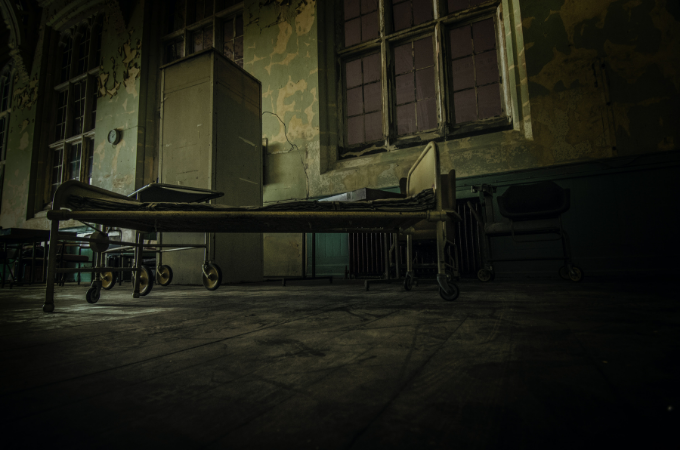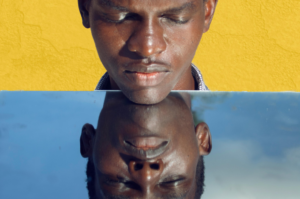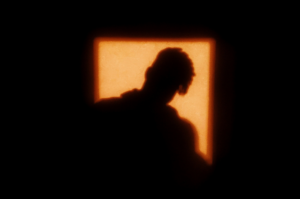
“Why would you keep this to yourself? Quietly consoling the creator to follow insanely to your silent speech, expecting not to be questioned? Leaving outlines in the dark, using that same power, absent now, present later in every soundless movement. The ancestors told me. Anyways, what time will you open your mouth to the madness going on around you?”
– Leesah
In my own experience, the prelude to people’s prejudice forever demands, and rarely allows. Why would I say that? I haven’t been myself lately, that’s why. I’m also an undertaker, my every days are saturated by images of the departed, what do I know? Besides the fact that many won’t believe this story, I’m aware there’s a family who’ll want to see me gone, in a fridge, once word of this gets out. I know this, and yet still, all of this has not proven good enough reason for me to keep my door shut.
For more than 20 years we’ve managed to keep this a secret, tight to our chest, living a lie and acting as human propellers to one of the most lucrative underground industries on this planet. Till now, it’s totally unheard of, a dream. Can you believe this, amassing millions each day from the hole in our graves? That last part is the reality.
Wait, let me start at the beginning. Even though it hurts going back to when Leesah was alive, this is possibly the only way it’ll all make sense. My dead girlfriend Leesah, my butterfly who embraced the concrete from day till night, told me about this cursed place and I never listened. Now imagine, before I met her, my life was chained and plagued by debt, loneliness, bad habits, and an in-depth abstinence from sex. Poor and penniless, desperate, to a point where you find yourself taking the first job that wags its tail. You don’t ask much, you take it, and you’re grateful. I’m talking about that kind of desperate.
When I began working here, I was told straight away, “look, surprising things will seldom take place, okay? Don’t be alarmed” but, remember, desperate. It had to be agreed upon before I could even be hired. At the worst I’d have to turn a blind eye, otherwise, there wasn’t anything odd that would be required of me, at least apart from the strange things the staff said I might end up seeing. My family, my precious mother and father who supported me in everything, warned me with deep concern and disgust.
“Our precious child, dear God. He has no idea what he’s doing. Help him, God. Please, he’s also yours!”
Taking an entirely different tune, my sisters casually told me that to them, I died a long time ago. They said this recently. Sometime in May or July, between autumn and winter. The weight of their words is what really took me to this edge, this invisible cliff, the one which becomes more and more tangible once your life starts going adrift, once you can no longer bear to look at yourself in the mirror, the one that takes all your rage and then asks you, “is that it?” This is where I am. This is why bringing down that parlour is all that matters at this point.
I’d tell you who I am, I want to, but it doesn’t matter. At Nanzi parlour, like every other funeral joint, we work closely with the dead, as awkwardly close as the religious. We house them, take care of them, but naturally, in such a frigid space there’s more bad than good. More fake than real and, less life than anywhere else. Still, I kept waking up every morning and showing up to work, putting in my shifts, obedient as a horse, as well as taking absolutely no risks in trying to go beyond the contours I’d been given.
In the beginning, all I did was valet the corpses and prepare them for their funerals, fine, but after a couple of months, things started to change. Suddenly, I’m told about the ‘limo’, the private room where certain bodies were taken through by special consent, meaning they were written off with a smiley face by the coroner. The limo was triple bolted, and we knew not to be stupid enough to go in there. But still, the bastards made sure that no one passed through, not even by chance. Swear to you, not even by fate.
Inside my mind, all I could hear was, “in that room, you’re not gonna come out the same person, know that. Don’t even doubt that. Don’t doubt it.”
With good reason, I could find no logic behind why a service parlour possesses a restricted and secret room. Why? The freaks allowed in there wore classy regalia, seriously impressive compared to us overalled workers. They had invented shifts to clock in and out, generally at night, and they only reported to Dr Steven. He was an unbelievably cunning, calculating man who could speak 14 languages, brushed his teeth with brandy, always dressed for temperatures below zero, and conversed with each and every one of his staff as if they were his most adored children.
“I’ll never punish you for asking, you hear me? Only assuming. Only assuming.”
I was first told that Dr Steven came from Germany. Twelve years later I found out this isn’t true. Now I was told that when the Nazis collapsed, he was in a sordid search for olive green lawns. In a short space of time, Dr Steven met Mr Kublai, his opposite for one reason: Mr Kublai always believed his decisions came straight from God. A real believer who, for the most part, gave his entire life to the funeral industry, doing it clean though, honest. None of what he came to later represent.
Mr Kublai worked alone, said he preferred it, building his honest business by posing low-cost solutions for grieving families in the ghetto, at a time when thousands of black people were dying, yearly, monthly, daily. Because of this, he was in a frantic state for a bigger building. This is how they met; Dr Steven was introduced to Mr Kublai through a friend, supposedly also from Germany. Both gifted with persuasion and paper-light tongues, they convinced Mr Kublai that Dr Steven had enough to help him attain his dream, and some change. He’d get the lion’s share of the money, more than he’d seen in his long, impassionate life. In exchange, what did Dr Steven want out of it? Peace for the dead, sheepishly asked for with a wolf’s voice. That’s all he said he wanted.
Eventually, the building stood amidst the Town of Santra, housing an average of 20 000 bodies. After only three years of prospering, despite his own internal conflicts, and being warned by those closest to him, Mr Kublai established Dr Steven as a solid partner. He went on to change Kublai Parlours to the current Nanzi. Throughout the years of Santra’s civil wars and oppression, both of them managed to make incredible fortunes.
However, naturally over time, stories started circulating about the kinds of things we did at this parlour. People were claiming that corpses looked altered upon arrival at their funerals, others were saying Dr Steven insisted on a closed casket, and some siblings of the cadavers couldn’t explain the difference but knew there was one. Before Leesah died, we had this doomed plan to store cameras at the entrance of the parlour, revealing some of the most reputable and feared men in our town being walked in by Dr Steven. We needed to know why, but we shouldn’t have cared. They killed her, right in front of me. They blew her head off and severed the rest of her body, only because she, like me, now knew too much.
I don’t know how I’m still alive. For now, I believe the reason to be in the last words of my beloved Leesah. The only one who could love me when everyone else couldn’t. In the end, all I’ll have is me, and the burden of exposing these twisted men.
My first day inside the limo is where my life undoubtedly changed. It was like a sharp deepened mirror, or maybe a filthy, ragged curtain removed from my eyesight to a place much closer. I could feel the pain of those shells, those temples, even though I didn’t know any of them. Nanzi Parlours was collaborating with highly funded syndicates and unnameable societies that specialize in buying of body parts for inexplicable reasons. Dr Steven once drunkenly said, “I wonder which fool would believe how much is really made from the dead?”
Right after, it was obvious attempts were being made to defer our attention, but his foolish remark remained. What Dr Steven meant was that the worth of a dead person costs much more than a living person could possibly fathom.
These parts were sold at inconceivable prices, some measures costing more than others. For instance, the left leg is said to carry more of the meesa imprint than the right, the left palm is said to be exceptional, and the heads were sold specifically to a special agency informally known as the “Snosam”. They have no headquarters, no logo, no paperwork, and no sense of humour. Before I saw any actual transactions on parts being made, I couldn’t comprehend it. The fact that people’s parts were used to maintain power and influence over our town.
The worst thing is that there’s a pattern to the actual people who end up being used. One day, working on the corpses, I noticed disturbing marks on every single one. They were all homicide cases too, and they all died on the same date, in the same way. Possessed, I began investigating these murders, meeting with their families and friends, disguising myself as a journalist working on a loose story about gun control. The things they told me all correlated with my hunch that these people were targeted and murdered. But why?
My haunting regret is telling Leesah. I should’ve never involved her in this. What’s worse is that I knew telling her would put her life in danger. Regrets at night tear me asunder, crying uncontrollably to the feelings of scorn that come with my own existence. A heavy burden made worse by the faces I see and the cries I hear from the dead in my dreams.
“They are looking for you, that call… that call is going to…”
Like I’ve already said, I’ve been on edge, depressed, and losing the few grains of sanity I have left. That call, it came from a private number warning me about the syndicates’ knowledge of my snooping. Before meeting with the police, I knew that there was more than a slim chance of deceit. The snosam had people in the force, maybe one or two influential figures. Maybe more. We’d be meeting at the Tantra cemetery, where I’d been sleeping for the past 2 weeks. I knew that they’d never search there, it was too obvious. An undertaker surely would stay far, far away from the grave.
Indeed, they never thought of the graveyard, but they were turning all the ghettos upside down in frantic states. Around town, they were also mounting agents in all the busy corners, trying to screen my every possible movement. They knew that sooner or later I’d need things in town. So, before I met the police to give them my hard-to-believe story, the bastards found me. Snosam’s agents were ruthless and yet, unlike them, someone had given them orders to spare me. Maybe Mr Kublai felt sorry for me, or Dr Steven thought of a creative way to articulate my expiry. What do I know?
Blindfolded, I was told to empty my pockets and speak to my God for the last time before we reached Nanzi. In my mind spun all the regrets, all the foolishness that resounded my actions prior to this very moment. Looking at my life, I realized that maybe I was born only to be a story for others to read or teach.
“Remove the blindfold, this part I think the man needs to see”
Dr Steven never said that, even though the whole finish had his writing, his workings, his vendetta, and his knack for not letting anything hurt the Parlour. By all means, as crazy as a burial studio storing 20 000 frames is, the man managed, like I said, to keep Nanzi out the books, the papers, the TV screens, and the possible lawsuits from families whose claims about their altered loved ones were hushed through untraceable pay-outs and threatening non-disclosures.
In reality, Mr Kublai said it.
“I knew we’d get here, sooner or later, the signs were there, I told Steven. He’ll never be able to deal with the death of that woman!”
He went on, stepping out the shadows to tell me it really was all his show. The Nanzi staff were blind to it, the corpses too. He had a plan of becoming our mayor, the top dog, the head of Santra, and some of his most loyal clients had the means to make it happen. I now was the only problem. I stood in their way, and as it seemed, it wouldn’t be for any much longer. Tomorrow, I’m sure someone else would be putting a tag on my toe. It doesn’t matter; I haven’t been myself lately.
“You see that arc? The one we placed at the back of the building, why do you think it’s there, why do you think we’ve never been caught?”
I thought I knew all there was to know about Nanzi, only to find out it wasn’t enough. The parts bought and brought protection, spiritual annulment over karma’s overdue, and the parts opened doors for some who’d come knocking to Mr Kublai for help. I knew that, but the arc? It was gifted to the parlour by Modos church, given as a means of reinforcing their hold over the town, in ways until now, I didn’t know. That wasn’t just it. Turns out, the arc was used for establishing Nanzi as a new worship place for some of its darkest collaborators, their hosting ground for secular rituals where the dead were already there. For riches, for power, and to collectively keep Santra asleep to what was going on, they all decided on the protection of Nanzi by all means.
“You get it? I should’ve warned you from the beginning how futile trying to take us down would be. Just never thought you’d have the guts to do it”
If anything, I can only respect the extent of the parlour’s arrangements in things seemingly distant from their influence. The senseless crime in the ghettos in my mind had absolutely nothing to do with where I worked, apart from those targeted. “We understood a purge is something the people would never agree upon themselves, so, we had to help”
“How?” I asked.
“We showed death over life as something to be celebrated! Adorned. I’m only telling you this because a fading man deserves his clarity.”
Throughout the entire 20 years I was there, Nanzi Parlour was assisting financially in the construction of instability and violence in our town, and I didn’t even know it. Done through the ingenious funding of rebel groups against the long-standing Mayor Tshisa, who was strangely also in on the coups, as well as a close friend of Mr Kublai, they also assisted in ensuring that weapons were easily accessible to those young and frustrated. I’m sure other things too but, their trace in all of this has been as careful as conserving silence among a throng of whispers.
“Why, why did you have to involve Leesah?”
Death now seemed impending, and Dr Steven’s freaks were all of a sudden getting agitated with all the talking. And at the end of the day, you can’t blame them, because, death is what they were most used to. It was, like all of us in the room, the place where we found the very meaning of life, by being absolutely present in all of its absence.
“Believe it or not, this wouldn’t have been possible without her. The arc, the innocence, it was all paid for by the power in that girl’s anatomy. You called her Leesah, we called her something else. “The One.” WHY DO YOU THINK WE HIRED YOU? Your outstanding work? You’re the fool that brought her to us.”
I’d never before made the connection. Her death had always to me, remained the byproduct of my own selfishness and inanity in solely just being with her, when really, they’d studied me, they’d studied her, and they knew that when they offered me that job, I’d have no choice but to take it. I’d be falling into a trap that wasn’t in any way supposed to resemble what it really was.
“We’re not going to kill you. I know you think we will. Relax. Instead, we want to see you lose your mind trying to convince a town we’ve put to sleep that its shining mast of strength is liable for all these unwholesome things you come to claim. Forget it, we only brought you in here so you could know we’re still in full control.”
In reality, they never killed me. Only my spirit. Like I said, I haven’t been myself lately, and whoever I tell this story to ends up not believing a single word I’ve said. So, in the words of my sisters, maybe I am already dead.
Photo by Jon Butterworth on Unsplash










COMMENTS -
Reader Interactions